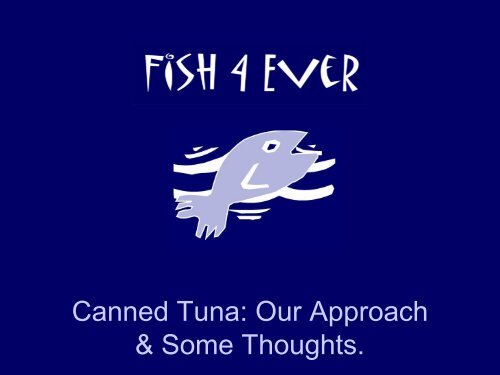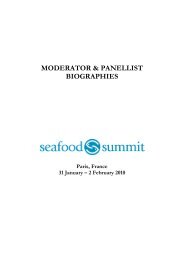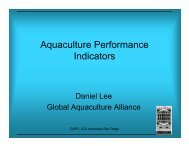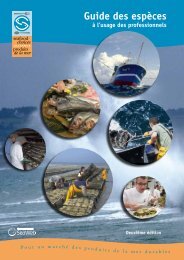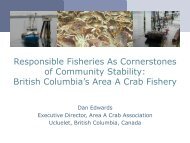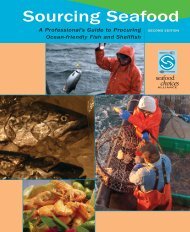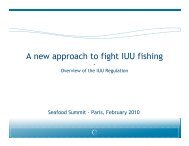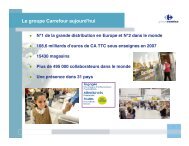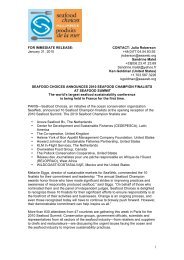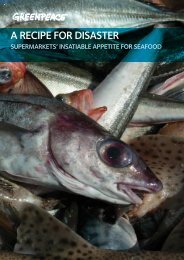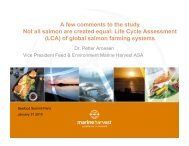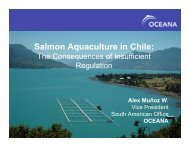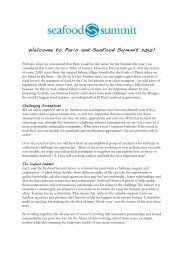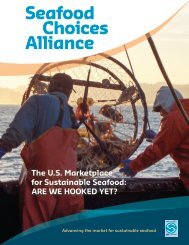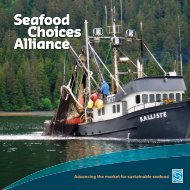Canned Tuna - Seafood Choices Alliance
Canned Tuna - Seafood Choices Alliance
Canned Tuna - Seafood Choices Alliance
Create successful ePaper yourself
Turn your PDF publications into a flip-book with our unique Google optimized e-Paper software.
<strong>Canned</strong> <strong>Tuna</strong>: Our Approach<br />
& Some Thoughts.
Reading<br />
London
Organico/Fish4Ever<br />
6 Employees<br />
£2million turnover<br />
100% organic/sustainable<br />
Customers: independents,<br />
on-line, some supermarkets<br />
and some export<br />
Fish4Ever – 10 years in May<br />
London<br />
Reading
Our Product Range<br />
Fish4Ever – 19 lines, 5 planned, 3 tunas:<br />
albacore/white, yellowfin + skipjack.
Ethical/Sustainable<br />
Products: 100% organic or sustainable - “Slow Food”<br />
principles – good, clean, fair.<br />
Product suppliers are mostly SME’s + co-op’s.<br />
Service suppliers are ethical champions.
MSC Commitment<br />
% of lines certified<br />
2008<br />
29% 71%<br />
2009<br />
52% 48%<br />
2010<br />
73% 27%<br />
Based on existing MSC lines and fisheries already certified where we are waiting for<br />
packaging as well as fisheries in process of certification.
MSC Range
Endorsements & Mentions<br />
Antony Worrall Thompson<br />
Hugh Fearnley Wittington<br />
Charles Clover<br />
Craig Sams<br />
Highly trusted ethical publications...
Shows,<br />
etc.
Trade Newsletter
… and a<br />
Video.<br />
Shot on location in the Maldives and Islington.
Sustainability: Our Approach
Land<br />
Sea People
Organic Agriculture.<br />
Better for Climate Change (but complicated).<br />
General eco-benefits (peak oil + phosphates,<br />
water retention, soil health).<br />
Bio-diversity: species, eco-system, resilience.<br />
No toxic chemicals – on land or in production.<br />
High animal welfare standards.<br />
Nitrate leaching – run-off from use of fertilisers<br />
and intensive animal rearing.
A n “IPCC for agriculture” which involved 400 academic/scientific authors<br />
in 52 countries sees organic as a best practise expression of agricultural<br />
knowledge, science and technology for a sustainable development to deal<br />
with the future social, health and food supply issues.<br />
www.aggassesment.org
Focus on Nitrate Leaching<br />
Up to 400 “dead areas” in coastal waters of the<br />
sea as a result of excessive leaching of<br />
phosphates and nitrates from fertilisers used in<br />
intensive farming....<br />
Diaz and Rosenberg in Science August 2008<br />
“Over 30% of UK estuaries and 15% of coastal<br />
waters are at risk from nutrients, pesticides, organic<br />
pollutants and heavy metals”<br />
Silent Seas 2008 – Marine Conservation Society
Map of “Dead Seas”<br />
Black spots indicate dead sea areas<br />
Diaz and Rosenberg in Science August 2008
Land Sea People
Main Sustainability Problems<br />
Overfishing<br />
Overcapacity, too much fishing, catch improvement,<br />
poor management or enforcement.<br />
Damaging Methods<br />
Endangered species (extinction), habitat/food-chain<br />
damage, by-catch/discard other fish + juveniles.<br />
Illegal Fishing<br />
Effect on management/stock levels.
Basic <strong>Tuna</strong> Market Info<br />
5 Commercial Species<br />
4 mil tons – skipjack, yellowfin, big-eye, albacore,<br />
bluefin. 5 RTA/RFMA.<br />
UK <strong>Canned</strong> Fish<br />
Circa 1/3 rd of total liveweight consumption; 50%<br />
is tuna, of which 95%+ is skipjack; c 90%<br />
Princes, John West, supermarket own label.<br />
UK Consumers<br />
Broad + deep coverage (age, wealth), cheap,<br />
mostly used as sandwich filling.
Our Original <strong>Tuna</strong> Research.<br />
<strong>Tuna</strong> in Trouble/Fortuna<br />
<strong>Seafood</strong> Watch Reports on<br />
individual tuna species<br />
“<strong>Tuna</strong> Resources” deLeina<br />
Moreno & Majkowski<br />
ICCAT and other RTA papers<br />
- statistics, science, reports.
Overfishing...<br />
What we can do:-<br />
1. Try to choose better management options.<br />
2. Support NGO’s recommendations and MSC.<br />
3. Engage the consumer and retailers.<br />
4. Prefer artisan/local fishing.<br />
What we can’t do:-<br />
1. Be the “expert opinion” on different stock levels.<br />
2. Swap and change.
Source: FAO<br />
Table of High Sea Management Bodies
Damaging Methods...<br />
What we can do:-<br />
1. Choose the most selective options.<br />
2. No long lines, no purse-seiners on FAD’s (or on<br />
dolphins), no gillnets, no driftnets.<br />
3. Avoid juvenile and spawning areas, especially if<br />
other concerns (illegal fishing/management).
From WWF: “<strong>Tuna</strong> in Trouble”
Illegal Fishing...<br />
What we can do:-<br />
1. Avoid areas known to be high risk.<br />
2. Request/notify our suppliers to monitor illegal<br />
boat lists – FAO, Greenpeace...<br />
What we can’t do:-<br />
1. Know what’s going on better than the<br />
scientists or managers on site.
Land<br />
Sea People
Our “People” Principles<br />
that the resource is the inheritance of the coastal<br />
communities that have traditionally or historically<br />
fished it.<br />
that trade is “fair” and workers’ rights respected,<br />
that employment, health and safety, food quality<br />
and environmental regulations are observed - both<br />
at the level of the fishing itself and the processing.<br />
that local fishing and local production (especially in<br />
North-South trade) is preferred.
Fish: A Huge Export Commodity<br />
developing world<br />
Source: FAO State of World Fisheries 2007
Trade Flows/Exports to Europe<br />
The waters of Africa supply some 25% of total fish<br />
(by volumes) consumed in Europe.<br />
Source: FAO State of World Fisheries 2007 (bn. tons)
Fair Fish Quotes<br />
Fortuna “Restoring the Balance” - WWF (2005)<br />
“16 of 17 (EU Fisheries Partnership Agreements)… involve tuna.<br />
Such distant water fishing often has devastating effects on coastal<br />
fisheries vital to local communities.”<br />
Pirate Fish on Your Plate - Earth Justice Foundation EJF (2007)<br />
“Africa alone is now losing almost 1 billion US dollars a year to<br />
illegal fishing activities. Pirate fishing operations are stealing an<br />
invaluable protein source from some of the world’s poorest people<br />
while damaging the livelihoods of legitimate local fishermen”<br />
Taking <strong>Tuna</strong> Out of The Can - Greenpeace (2008)<br />
“For equitable alternatives, purchasing tuna directly from the coastal<br />
state operators is always preferred, as access agreements with foreign<br />
fishing nations are by and large incredibly unfair to the developing<br />
coastal states”
Artisan Fleet versus<br />
Industrial Fleet<br />
In this example from the Indian Ocean, the artisan fleet employs more<br />
than 4x the number of boats and almost 3x the number of people to catch<br />
approximately the same amount of fish.<br />
Source: FAO State of World Fisheries 2007
Mapping Illegal Fishing in Africa<br />
Source: Marine Resource Assessment Group (MRAG) (2005).
The <strong>Tuna</strong> Example: West Africa<br />
yellowfin<br />
The map on the left shows foreign purse-seiner catch in yellow, and<br />
local baitboats (pole&line) in red, long lines in blue: ICCAT 2000/04.
...Also a Problem of Fish Size.<br />
<strong>Seafood</strong> Watch: Yellowfin <strong>Tuna</strong> <strong>Seafood</strong> Report<br />
According to figures quoted from<br />
ICCAT: “the average size of yellowfin<br />
caught ranges from 2.5 kg in Tema<br />
(Ghana) to 30 kg around the Azores,<br />
Canary Islands, and Cape Verde”<br />
“The main spawning ground (of<br />
yellowfin) is the equatorial zone of the<br />
Gulf of Guinea (off the Coast of<br />
Ghana), with spawning primarily<br />
occurring from January to April.<br />
Juveniles are generally found in<br />
coastal waters off Africa”.<br />
Source Monterey Bay Aquarium: <strong>Seafood</strong> Watch
….and for East Africa<br />
skipjack<br />
The map on the right comes from the IOTC and shows in light green<br />
the purse-seiner catch for skipjack tuna from 2000 to 2006.
UK Skipjack <strong>Tuna</strong> Imports<br />
More than 50% of UK imports are from East/West African waters<br />
where high levels of illegal fishing have been recorded on top of<br />
the general issue of “resource theft.”<br />
Source: Globefish March 2008, the FAO Market Reports Website
Issues and Dilemmas
2009: The Year of <strong>Tuna</strong>...
Apparent Results<br />
Wide support for a ban on bluefin fishing.<br />
Transfer in UK of several major customers to<br />
pole and line skipjack.<br />
Formation of ISSF – (International <strong>Seafood</strong><br />
Sustainability Foundation).<br />
Little improvement in media/public knowledge.<br />
The “broader picture” is missing.
The Missing Dimension<br />
as featured in the Greenpeace Video.<br />
If people want us<br />
to fish<br />
sustainably, they<br />
need to pay for it,<br />
otherwise we<br />
have no choice -<br />
we will need to<br />
fish like everyone<br />
else.
Market Research People Say...<br />
I prefer fish that is ethically sourced<br />
and kinder to the environment (2008)<br />
25% agree strongly and 35% agree.<br />
Prove It Accountability<br />
Environmental and ethical issues<br />
retain the power to attract attention<br />
and spend with nearly half of UK<br />
adults (25 million) viewing them as<br />
important or very important and in the<br />
US 39% say they’d pay more for<br />
environmentally friendly products.
...But the Truth is More Prosaic.<br />
It’s about price and pleasure.<br />
Vast majority of<br />
consumers not ready to<br />
pay more for ethical<br />
values.<br />
Consumption is<br />
first of all a selfish<br />
act.<br />
Ethics/sustainability on the cheap.<br />
The more common a product, the harder it is<br />
to charge a premium on the market price.
Ricki Gervais as Zeitgeist<br />
Stressed/Busy<br />
Overwhelmed<br />
Cynical /ironic<br />
Un-believing/low trust<br />
Atomised<br />
Disconnected<br />
Confused<br />
Un-knowledged<br />
Self<br />
First
The Zeitgeist Dilemma<br />
It’s your job<br />
to do it for me<br />
Consumer<br />
“I will If You Will”<br />
“It’s not<br />
my problem”<br />
“I don’t believe<br />
or trust it”<br />
“Why should I pay<br />
More”<br />
Marketing<br />
“Make it simple”<br />
- but it isn’t!<br />
“Value for values”<br />
- but you can’t.<br />
Emotional message<br />
- but we’re weary.<br />
You won’t buy<br />
if /when I do...<br />
Retail<br />
More a risk than<br />
an opportunity<br />
Ethics as an<br />
optional<br />
consumer choice
Our “Fair Fish” <strong>Tuna</strong>...<br />
A simple idea: support the local boats and the<br />
local packer and therefore the local community.<br />
Make sustainability financially viable.<br />
But most Maldives tuna is canned in Thailand<br />
and the market price is impossibly cheap.
...In a Non-Fair Market Place<br />
Thai-Maldives<br />
Pole and line fishing<br />
Local industry supported<br />
Decent working conditions<br />
Fair fish premium<br />
Pole and line fishing<br />
A real incentive to support<br />
and even improve<br />
sustainable approach<br />
Premium only obtainable if<br />
market is paying more but<br />
approach is lowest cost<br />
commodity-driven.
Where “sustainability” is now<br />
for brands/products<br />
A secondary “feel good” argument behind a<br />
“real” consumer benefit.<br />
A “competitive edge” argument but not the core.<br />
An insurance policy against bad publicity.<br />
Part of the advertising budget.<br />
A dysfunctional add-on to the<br />
business of making money.
… and where it needs to be.<br />
Ethical –<br />
social and green<br />
values built into<br />
the products<br />
we buy as<br />
consumers<br />
Civic Society<br />
Pressure for<br />
Change<br />
Government<br />
to re-set the rules<br />
and enforce them.<br />
Market economics is not<br />
“fit for purpose.”
Some Questions<br />
Does “sustainability” need an official definition?<br />
Internalising externalities: can we price-in<br />
externalities - and if so which ones qualify?<br />
Is POWER and/or SIZE an issue in sustainability?<br />
Does the actual legal remit of companies need to<br />
change?
if<br />
“business as usual<br />
is not an option”
- it must be done differently...


